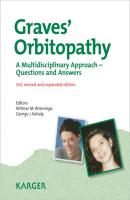Graves' Orbitopathy. Группа авторов
Чтение книги онлайн.

Читать онлайн книгу Graves' Orbitopathy - Группа авторов страница
Название: Graves' Orbitopathy
Автор: Группа авторов
Издательство: Ingram
Жанр: Зарубежная психология
isbn: 9783318060850
isbn:
Graves’ Orbitopathy
A Multidisciplinary Approach – Questions and Answers
3rd, revised and expanded edition
Graves’ Orbitopathy
A Multidisciplinary Approach – Questions and Answers
3rd, revised and expanded edition
Editors
Wilmar M. Wiersinga Amsterdam
George J. Kahaly Mainz
116 figures, 69 in color, and 52 tables, 2017
| _______________________Wilmar M. Wiersinga, MD, PhDDepartment of Endocrinology and MetabolismAcademic Medical CenterUniversity of AmsterdamMeibergdreef 9NL–1105 AZ Amsterdam (The Netherlands) | _______________________George J. Kahaly, MD, PhDDepartment of Medicine IGutenberg University Medical CenterLangenbeckstrasse 1DE–55131 Mainz (Germany) |
Library of Congress Cataloging-in-Publication Data
Names: Wiersinga, Wilmar M., editor. | Kahaly, George, editor.
Title: Graves' orbitopathy : a multidisciplinary approach : questions and answers / editors, Wilmar M. Wiersinga, George J. Kahaly.
Description: 3rd, revised and expanded edition. | Basel ; New York : Karger, 2017. | Includes bibliographical references and indexes.
Identifiers: LCCN 2017031321| ISBN 9783318060843 (softcover : alk. paper) | ISBN 9783318060850 (electronic version)
Subjects: | MESH: Graves Ophthalmopathy--diagnosis | Graves Ophthalmopathy--pathology | Graves Ophthalmopathy--therapy | Ophthalmologic Surgical Procedures | Diagnosis, Differential | Ophthalmologic Surgical Procedures
Classification: LCC RE715.T48 | NLM WK 265 | DDC 617.7--dc23
LC record available at https://lccn.loc.gov/2017031321
Disclaimer. The statements, opinions and data contained in this publication are solely those of the individual authors and contributors and not of the publisher and the editor(s). The appearance of advertisements in the book is not a warranty, endorsement, or approval of the products or services advertised or of their effectiveness, quality or safety. The publisher and the editor(s) disclaim responsibility for any injury to persons or property resulting from any ideas, methods, instructions or products referred to in the content or advertisements.
Drug Dosage. The authors and the publisher have exerted every effort to ensure that drug selection and dosage set forth in this text are in accord with current recommendations and practice at the time of publication. However, in view of ongoing research, changes in government regulations, and the constant flow of information relating to drug therapy and drug reactions, the reader is urged to check the package insert for each drug for any change in indications and dosage and for added warnings and precautions. This is particularly important when the recommended agent is a new and/or infrequently employed drug.
All rights reserved. No part of this publication may be translated into other languages, reproduced or utilized in any form or by any means electronic or mechanical, including photocopying, recording, microcopying, or by any information storage and retrieval system, without permission in writing from the publisher.
© Copyright 2017 by S. Karger AG, P.O. Box, CH–4009 Basel (Switzerland)
Printed on acid-free and non-aging paper (ISO 9706)
ISBN 978–3–318–06084–3
e-ISBN 978–3–318–06085–0
Contents
Preface to the Third, Revised and Expanded Edition
Wiersinga, W.M. (Amsterdam); Kahaly, G.J. (Mainz)
Preface to the Second, Revised Edition
Wiersinga, W.M. (Amsterdam); Kahaly, G.J. (Mainz)
Wiersinga, W.M. (Amsterdam); Kahaly, G.J. (Mainz)
Dickinson, A.J. (Newcastle upon Tyne); Hintschich, C. (Munich)
What Are the Common Signs and Symptoms of Early Graves’ Orbitopathy?
What Are Other Signs and Symptoms of Graves’ Orbitopathy?
What Signs Should Question the Diagnosis of Graves’ Orbitopathy?
Are There Racial Differences in How Graves’ Orbitopathy Manifests?
Is the Presentation of Graves’ Orbitopathy Different in Older Compared to Younger Patients?
Why Can the Clinical Presentation of Graves’ Orbitopathy Be So Variable?
Can You Give Me a Short Mechanistic Explanation for All These Clinical Manifestations?
What Do the Terms “Activity” and “Severity” Denote?
Why Is It Important to Distinguish Activity and Severity when Evaluating Patients?
What Signs and Symptoms Are Valuable for Assessing Activity?